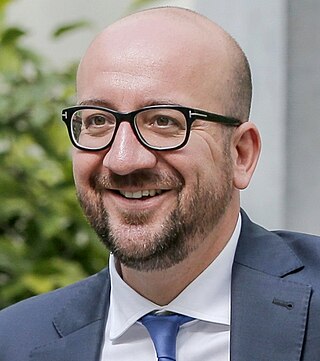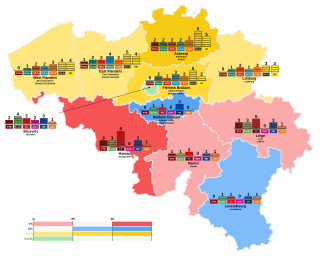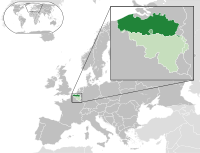
Flemish Brabant is a province of Flanders, one of the three regions of Belgium. It borders on the Belgian provinces of Antwerp, Limburg, Liège, Walloon Brabant, Hainaut and East Flanders. Flemish Brabant also surrounds the Brussels-Capital Region. Its capital is Leuven. It has an area of 2,118 km2 (818 sq mi) which is divided into two administrative districts containing 65 municipalities. As of January 2024, Flemish Brabant had a population of over 1.19 million.

The minister-president of Flanders is the head of the Flemish Government, which is the executive branch of the Flemish Region and Flemish Community.
Vooruit is a Flemish social democratic political party in Belgium. It was known as the (Flemish) Socialist Party until 21 March 2021, when its current name was adopted.

The Federal Government of Belgium exercises executive power in the Kingdom of Belgium. It consists of ministers and secretary of state drawn from the political parties which form the governing coalition. The federal government is led by the prime minister of Belgium, and ministers lead ministries of the government. Ministers together form the Council of Ministers, which is the supreme executive organ of the government.

The Flemish Government is the executive branch of the Flemish Community and the Flemish Region of Belgium. It consists of a government cabinet, headed by the Minister-President and accountable to the Flemish Parliament, and the public administration divided into 13 policy areas, each with an executive department and multiple agencies.

Matthias Diependaele is a Belgian politician affiliated to the New Flemish Alliance (N-VA) who is the current Minister-President of Flanders, having taken office in 2024. He additionally serves as the Flemish Minister for Economy, Innovation en Industry, External Affairs, Digitalisation, and Facility Management.

Jan Jambon is a Belgian businessman and politician of the New Flemish Alliance (N-VA) who served as Minister-President of Flanders from 2019 to 2024. He replaced Kris Peeters as a member of the Belgian Chamber of Representatives in 2007. The N-VA was, at that time, partnered with the Christian-Democratic and Flemish party. In June 2010 and May 2014 he was re-elected on an N-VA list.
Regional elections were held in Belgium on 25 May 2014 to choose representatives for the Flemish Parliament, Walloon Parliament, Brussels Parliament and the Parliament of the German-speaking Community. These elections were held on the same day as the 2014 European elections as well as the 2014 Belgian federal election.
Following the simultaneous federal elections and regional elections of 25 May 2014, negotiations started to form a new Federal Government as well as new regional governments: a Flemish, Walloon, French Community and Brussels Government. A Government of the German-speaking Community was formed only a few days after the elections.

The Bourgeois Government (Regering-Bourgeois) was the Flemish Government formed following the 2014 Flemish Parliament election. The cabinet consisted of a centre-right coalition of the nationalist New Flemish Alliance (N-VA), the Christian Democratic and Flemish party (CD&V) and the Open Flemish Liberals and Democrats. It had a large majority in the Flemish Parliament and the main opposition parties were the Socialist Party (sp.a), which had been part of nearly all previous governments in recent history, and the Green party.

The Michel I Government was the Federal Government of Belgium formed following the 2014 Belgian government formation and sworn in on 11 October 2014. The administration was a centre-right coalition of the New Flemish Alliance (N-VA), the Christian Democratic and Flemish (CD&V), the Open Flemish Liberals and Democrats and the Reformist Movement (MR). The prime minister was Charles Michel. The government had an agenda of socio-economic reforms, especially through austerity measures, with its priorities being improving Belgium's economic competitiveness and reducing unemployment. It fell in December 2018 over the Global Compact for Migration.

The Council of Ministers is the supreme executive organ of the Federal Government of the Kingdom of Belgium. It is a cabinet composed of the Prime Minister, who leads it, and up to fourteen senior ministers. Federal secretaries of state are members of the government, but not part of the Council. The King of the Belgians historically presided over the Council, but this has not happened since 1957. The Council of Ministers formally became a permanent policy structure with the constitutional revision of 1970.

Federal elections were held in Belgium on 26 May 2019, alongside the country's European and regional elections. All 150 members of the Chamber of Representatives were elected from eleven multi-member constituencies.
In the run up to the 2024 Belgian federal election, various organisations carried out opinion polling to gauge voting intention in Belgium. The results of nationwide polls are usually numerically split into the three Belgian regions: Flanders, Brussels and Wallonia. Federal seat projections for the Chamber of Representatives are presented together under these regional polls. The federal election was part of a group of elections which also include the regional elections and the European elections held on the same day. Some polls might be undefined voting intentions without differentiating between the elections.

The Homans Government (Regering-Homans) was the interim Flemish Government formed and sworn in on 2 July 2019, following the departure of Flemish Minister-President Geert Bourgeois who took up his seat in the European Parliament following the 2019 European Parliament election in Belgium. It was replaced by the Jambon Government on 2 October 2019.

The Jambon Government (Regering-Jambon) was the Flemish Government formed and sworn in on 2 October 2019, following the 2019 Belgian regional elections and replacing the interim Homans Government. It was replaced by the Diependaele Government on 20 September 2024.

The De Croo Government is the incumbent Federal Government of Belgium, led by Prime Minister Alexander De Croo since 1 October 2020. It has acted in a caretaker capacity since the resignation of Prime Minister Alexander De Croo on 10 June 2024 following the 2024 Belgian federal election.

Federal elections were held in Belgium on 9 June 2024. The Chamber of Representatives received 150 members with five-year terms. European and regional elections took place on the same day.
Following the 2024 Belgian federal and regional elections, Government formation talks began on 10 June. Incumbent Prime Minister Alexander De Croo has announced his resignation and his party's leader Tom Ongena has declared that Open Flemish Liberals and Democrats would not be a part of the next federal government.














